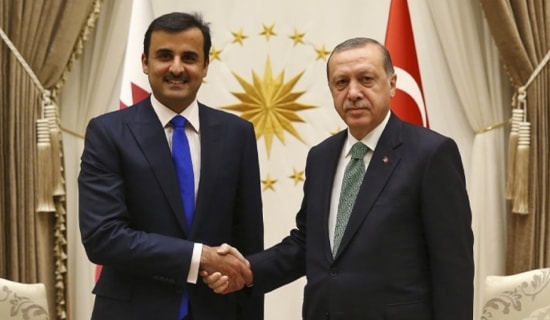In an interview with Yuri Sokolov for Gazeta.Ru, Leonid Slutsky, a member of the Duma International Affairs Committee pushed back on commentary that was rife following the hurried US withdrawal from Afghanistan.[1] Then there were predictions that Afghanistan would be followed by a US withdrawal from Iraq and Syria. Not so fast argues Slutsky, the US will remain in the Middle East, and American actions count more than statements. All countries in the region must take account of the US that has done positive things in the region since the arrival of the Biden Administration that dumped Jared Kushner's Israel-centric policy.
The interview with Slutsky follows below: [2]

Leonid Slutsky (Source: Oreanda.ru)
– After the US withdrawal from Afghanistan, discussions arose that Washington may abandon Iraq as well. What's your opinion on that?
–What matters is where geographically and with what weaponry the US plans to remain on the territory of that country. All that Washington has announced in recent years and months with reference to its "zone of vital interests" and military presence in various global regions including the Near East can be briefly described in this way: the rhetoric is at variance with the following actions.
Today's Iraq has just begun rebuilding its statehood in the full sense of the word, as for many years, since 2003 when the US destroyed the [Saddam] Hussein regime, Iraq remained unfortunately a country without a state. there was no state power in Iraq, unfortunately. The same fate awaited Syria, because, as we've realized, the US was ready to deploy any means to wipe the Bashar al-Assad regime, that didn’t suit Washington off the face of the earth.
Earlier the US leader announced that they are officially leaving Iraq (in July 2021, Joe Biden announced the end of the US "combat mission" in Iraq - Gazeta.ru), but [the Pentagon spokeswoman, Commander Jessica] McNulty deliberately denied this statement. Let me note, that in this case [the US presence in Iraq] depends on their agreements with the cabinet of [Iraqi Prime Minister] Mustafa Kazemi.
Recently, Iraqi Foreign Minister Fuad Hussein, while on a visit to Moscow, explained that the US will withdraw from Iraq in the foreseeable future. However, we see on a number of grounds that such is not the case. Well, that's "sovereign" Washington - Baghdad relations for you.
– Does it mean that Americans are likely to remain in the Middle East?
– The US won't leave the region in radical fashion. However, certain analysts hastened to reach such a conclusion. They were partially guided by the fact that the US withdrew its "Patriot" missile systems from the Prince Sultan airbase in Saudi Arabia. There was a series of announcements statements that the Americans intend to at least qualitatively reduce their military presence, or even to terminate it altogether.
However, actually, the American position is different. One should bear in mind that the US has a strong "Al Udeid" airbase in Qatar. It was precisely to there that the US personnel and various military hardware from Afghanistan were transported.
So far, the Americans are still present at the Al-Tanf international coalition military base in Syria. And not just there. The Americans believe the Trans-Euphrates region to be their zone of strategic interest.
– Speaking of Syria. What can you say about Washington's plans there?
–What is happening surrounding the US military presence in Syria is unlikely to conclude constructively. Unfortunately, our "strategic friends in Washington" (as I like to call them) are either torpedoing or withholding support from any initiatives related to the work of the Constitutional Committee, de-escalation zones, ceasefires and humanitarian assistance.
By the way, I am in no way anti-American, on the contrary, I am a staunch pan-Atlantacist. After all, there are many supporters of improving relations with Russia in the US itself at the level of civil society, foundations and in academia that We absolutely don't see in the Washington establishment, or at any levels of American power for that matter, including the houses of Congress.
I want to stress that the State Duma Foreign Affairs Committee maintains contacts with the Middle East states and their parliaments. We, along with the Gazeta.Ru newspaper, will follow the events unfolding [in the region] as they are very sensitive for Russia. We are closely tied to many countries of the region by an entire series of infrastructurally important trends.
– Has the American policy towards the Middle East changed with the arrival of the Joe Biden administration?
– Yes, it has definitely changed. Trump was putting Israel at the forefront. The Senior Advisor to the President [Jared] Kushner, was in fact the originator of the Israel–United Arab Emirates normalization agreement signed September 2020.
A number of Arab states, following the UAE, have signed similar normalization agreements with Israel. As we can witness, this policy is no longer supported by the new US administration, but the agreements have been signed. They received mixed evaluations in the region. Saudi Arabia, in particular, which until recently was a strategic partner of the UAE, didn’t agree. They [the Saudis] adopted new rules on the import duties, which prescribe that all the goods produced in free economic zones (including those situated on the UAE territory) with Israel participation, won't benefit from duty-free entry and generally preferential regime.
If Trump had remained president, and Israel would still have been the center of US attention, it would be hard to imagine Washington’s return to the Iran nuclear deal. It would have been hard to imagine a number of other sound Joe Biden initiatives, which facilitated a strategic release of tensions for the countries of the region and in a series of conflicts. This is particularly true for Yemen.
– What's Russia's stance in the region?
– Recently the Russian "Concept for collective security in the Persian Gulf zone" was proposed. It is necessary to reestablish a full-scale dialogue in the framework of UN Security Council Resolution 2231 of 2015 (a resolution on the Iranian nuclear issue - Gazeta.Ru), and to lift sanctions [on Iran]. Other regional states should also conduct an active dialogue with Tehran. I'm convinced that in the near future it will not be simple but it will be most constructive.
I am also counting on Russia's cooperation with the regional states, as well as with the member-states of the Arab League (into which Syria should be returned as soon as possible) will be constructive and effective.
Among the decisions reached this year, I would like to note the decisions passed at the Summit of the Cooperation Council for the Arab States of the Gulf held in Al-'Ula in early 2021, which put a stop to the Qatar blockade. As the Russian President noted, any, even the most complex issues must be resolved through negotiations. Sanctions, restrictions and blockades are counterproductive.
– At times it seems that the US is having troubles with its allies in the Middle East. Is this the true?
– Everyone takes Washington's stance into account. For instance, Qatar is a US ally in the region regarding the issues of defense and security. It's impossible to label the region as pro- or anti-American. There is no black and white in real international politics, there are many halftones in-between.
True, there are states that are openly avoid cooperating with the Americans, but even they have to make allowances for the US role in regional affairs. In general, avoiding contacts with any power is a poor approach. We need to communicate more, to avoid distorting the truth about each other
[1] See MEMRI Special Dispatch, No. 9475, Russian Officials Gloat Over Announced US Military Withdrawal From Iraq, Experts Minimize Its Expected Impact, August 2, 2021.
[2] Gazeta.ru, October 16, 2021.




